(4) Gender and Inclusive Growth
1. Promotion of Women’s Empowerment and Participation
The social norms and systems in developing countries are generally shaped by men’s perspectives, which renders women to be put in vulnerable positions in many aspects. Compared to the early 2000s, when the MDGs were established, girls’ enrolment rate has improved considerably, women’s political participation has increased, and as a result more women hold senior-level posts. However, there are still many countries where women continue to lack the same opportunities as men to participate in decision-making processes, which is not restricted to the public sphere such as high-level government decision-making, but also includes family and other private decision-making that affect the lives of women.
On the other hand, women are critical actors of development, and their participation will lead to not only the improvement of their own lives but also to more effective development. For example, improving the literacy of women who have had little or no educational opportunities increases their access to correct information about public health and prevention of infectious diseases such as HIV/AIDS. This leads to appropriate family planning practice, and the promotion of women’s social advancement and economic empowerment. Moreover, it contributes to the inclusive economic growth of developing countries.
In the “2030 Agenda,” it is strongly and clearly expressed that “Realizing gender equality and the empowerment of women and girls will make a crucial contribution to progress across all the Goals and targets.” Moreover, Goal 5 of the SDGs seeks to “Achieve gender equality and empower all women and girls.” Gender equality and promoting women’s empowerment are essential for realizing “quality growth.” For this purpose, it is important for men and women to participate equally in all phases of development cooperation and to reap the benefits equally.
■Japan’s Efforts
With a determination that the 21st century should be a world with no human rights violations against women, Japan has been playing a leading role in the international community to promote gender mainstreaming and women’s empowerment in order to build “a society where women shine” both domestically and globally, by setting the following three priority fields: (i) promotion of women and girls’ rights, (ii) improving an enabling environment for women and girls to reach their full potentials, and (iii) advancing women’s leadership in political, economic and other public fields.
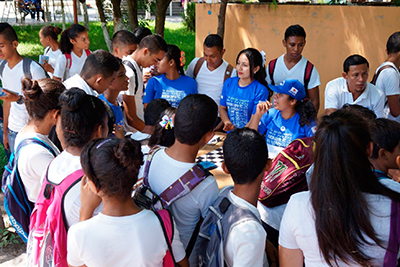
Peer leaders implementing enlightenment activities under the “Adolescent Reproductive Health Promotion Project in El Paraiso City and Alauca City in El Paraiso Department” in Honduras. It has produced results such as a gradual decline in adolescent pregnancies. (Photo: AMDA Multisectoral & Integrated Development Services)
The launch of the Women Entrepreneurs Finance Initiative (We-Fi)* was announced in July 2017 at the G20 Hamburg Summit. This is an important initiative that aims to help women in developing countries make their own living and to promote their active involvement and contribution to society. Japan strongly supports this initiative and has provided $50 million in assistance. Furthermore, at the G7 Charlevoix Summit held in Canada in June 2018, gender was raised as a cross-sectoral theme, the continuation of initiatives for gender equality was confirmed in the Summit Communique, and the “Charlevoix declaration on quality education for girls, adolescent girls and women in developing countries,” “Charlevoix commitment to end sexual and gender-based violence, abuse and harassment in digital contexts,” etc. were adopted. Japan took this opportunity to announce its provision of $200 million for quality education for girls, adolescent girls, and women in developing countries and human resources development.
In addition, Japan is providing assistance through the United Nations Entity for Gender Equality and the Empowerment of Women (UN Women) and in 2017, Japan provided approximately $22 million to contribute to initiatives for the political participation and economic empowerment of women, eradication of sexual and gender-based violations against women and girls, a stronger role for women in the peace and security fields, strengthening of gender considerations in policies and budgets, etc. In Lebanon, Japan provided vocational training in make-up, catering, flower arrangement, and etc. in 13 social development centers in Beirut and elsewhere, to Lebanese women and Syrian refugee women. As a result, 3,780 women acquired skills for improving their livelihoods, and 800 of these women actually obtained jobs. It can be said that this project is a good example of this type of assistance, as it helped the women to acquire skills, find jobs, improve their livelihood, enhance their social status, and become independent in their households, as well as contributed to social harmony between the Syrian refugees and the Lebanese people.
Japan considers that sexual violence in conflict cannot be tolerated. Therefore, Japan places importance on collaboration with the UN Office of the Special Representative of the Secretary-General on Sexual Violence in Conflict (SRSG-SVC). In 2017 Japan contributed $1.1 million to the Office of SRSG-SVC for the implementation of projects in Iraq and the Central African Republic to enhance prevention and response capacity to sexual violence through assistance for the development of legal systems to punish perpetrators. Japan’s ongoing support to this office is being manifested in concrete results. For example, in 2017 in the Democratic Republic of the Congo, 1,726 cases of sexual violence were reported, resulting in 643 judgements and the handing down of 460 sentencing decisions.
Furthermore, in order to realize a peaceful society more effectively, it is vital to integrate a gender perspective and to secure women’s participation in all stages of conflict prevention, conflict resolution and peace-building. Therefore, in 2015 Japan formulated and implemented its National Action Plan for the implementation of United Nations Security Council resolution 1325 on Women, Peace and Security (WPS) and other relevant resolutions, and is currently formulating a revised version for fiscal year 2019. Moreover, in regards to the implementation of the G7 WPS Partnership Initiative agreed at the G7 Foreign Ministers’ Meeting in 2018, Japan chose Sri Lanka as its partner country, and from FY2019, assists Sri Lanka with the formulation of its WPS action plan. Japan will further promote assistance for the empowerment of Sri Lankan women, including women who became widows due to the civil war over the past 26 years, in cooperation with the embassies of each G7 country in Sri Lanka.
Japan will continue to cooperate with other countries to address the diversifying development issues through these efforts for achieving empowerment of all women and girls, gender equality, and building a society and system in which men and women support each other.
- *Women Entrepreneurs Finance Initiative (We-Fi)
- Women Entrepreneurs Finance Initiative (We-Fi) is an initiative launched by the World Bank with 14 participating countries, aiming to support the economic independence of women in developing countries and to promote their social and economic participation, by implementing support to overcome the challenges which women entrepreneurs and women-led SMEs in such countries face including access to finance, legal systems, and others. The types of assistance We-Fi provides include financial access assistance for women entrepreneurs, advisory service to facilitate greater business with women entrepreneurs and technical assistance to improve the legal and regulatory systems of developing countries. The initiative is aiming to make more than $1 billion funds available, with approximately $340 million from donor countries and additional resources from the private-sector and international financial institutions.
●Tanzania
Project for Prevention of School Dropouts and Social Isolation due to Unwanted Pregnancy by Increasing Study Motivation and Health Literacy with Mobile Library Education
JICA Partnership Program (JPP) (April 2017 – September 2019)
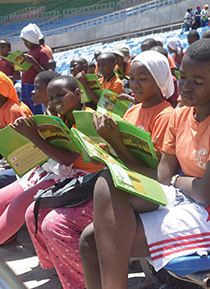
Female pupils earnestly reading educational picture books related to awareness of adolescent pregnancy prevention (Photo: JICA)
In Tanzania, it is said that 44% of the female population have experienced their first pregnancy or childbirth by the age of 19. Adolescent pregnancy not only carries a high risk of death, but in the case of pupils attending school, it can also force them to drop out. The number of dropouts due to pregnancy is reported to be 8,000 per year within Tanzania alone. Although teenage girls who dropped out of school rely on their parents to live, it is very difficult for them to find job opportunities when returning to society after childbirth. This is due to the delay in their studies and a lack of support, which enables them to readily slip into poverty. Underlying this situation is the fact that puberty education (reproductive health education) is almost entirely nonexistent in schools in Tanzania, and it is not customary for parents to teach this to their children at home.
In order to improve this situation, “Class for Everyone,” a Japanese NPO, launched a puberty education program aimed at elementary and junior-high schools in Tanzania, together with affiliates of Japanese universities and Tanzanian midwives. Currently, they are visiting schools in Korogwe District in Tanga Region, with a mobile library, providing puberty education for the prevention of adolescent pregnancy. The children who have been educated are gradually gaining an awareness of adolescent pregnancy prevention, and the program is popular among the teachers of the target schools, who have responded, “Please come again.” In addition, visits by the mobile library are expected to increase the desire to learn among pupils and the rate of advancement to secondary school.
On November 25 – 26, 2017, Tanzania’s first women’s athletics competition, “LADIES FIRST,” was held, as an initiative aimed at achieving a gender-equal society in the country. As a side event of the competition, an adolescent pregnancy prevention awareness program was implemented by “Class for Everyone” and a local counterpart NGO “New Rural Children Foundation,” where educational picture books were distributed to 1,000 female pupils from nearby regions who came to watch the competition. Furthermore, at the “2nd LADIES FIRST” held on November 24 – 25, 2018, the same awareness program was carried out, not only for female pupils, but for male pupils as well.
2. Disparity Reduction (Assistance for People who Tend to be in Vulnerable Situations)
Ongoing efforts are being made to implement initiatives towards the achievement of the SDGs. Meanwhile, a number of issues such as difficulty in identifying where problems lie and addressing them properly from the broader national level are gradually being brought to light. Responding to the “increase of disparities” faces similar problems. Moreover, challenges such as poverty, conflicts, infectious diseases, terrorism, and natural disasters have varying impact depending on the situations that individuals are in, including their country and region, or whether they are women and/or children. In order to deal with this situation, it is effective to adopt an approach that takes the standpoint of individual people, which is indispensable for the realization of a society that fulfills the SDGs principle of “no one will be left behind.”
■Japan’s Efforts
●Assistance for Persons with Disabilities
It is important that capacity building and community development are promoted to ensure the social participation and inclusion of people in vulnerable situations in society, especially persons with disabilities. It is Japan’s policy to pay due attention to the socially vulnerable, including persons with disabilities, when planning and implementing ODA policies for development cooperation. Policies for persons with disabilities cover a number of different fields, including welfare, health and medical care, education, and employment. Japan has applied the techniques and experiences it has accumulated in these fields through ODA and NGO activities for persons with disabilities in developing countries. For example, Japan carefully tailors its assistance to suit various local needs, such as promoting barrier-free design in the construction of railroad infrastructure and airports, building vocational training centers and rehabilitation facilities for persons with disabilities, and providing minibuses for their transportation.
Additionally, through JICA, Japan is providing a wide range of technical cooperation to enhance the capacity of organizations and personnel offering assistance to persons with disabilities in developing countries. These efforts include the acceptance of trainees from developing countries and the dispatch of JOCVs and experts from various sectors, including physical and occupational therapists and social workers.
The Convention on the Rights of Persons with Disabilities ratified by Japan in 2014 established independent clauses setting out that state parties would undertake measures for international cooperation and its promotion (Article 32), and Japan continues to contribute to improving the rights of persons with disabilities in developing countries through ODA and other means.
●Assistance for children
Generally, children tend to be in vulnerable situations, and today, there are many children in regions around the world that have been placed in cruel situations due to conflicts, natural disasters, etc. Also, the number of child refugees is rapidly increasing. Japan is providing a variety of humanitarian assistance and development assistance to improve the situation of children in developing countries.
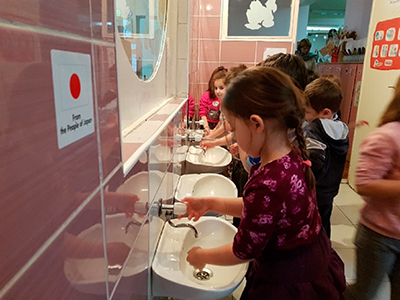
Children using the refurbished toilets in Prolet Kindergarten, located in the municipality of Karpos in Northern Macedonia (Photo: Galina Strachkova, Grass-Roots Project Coordinator/Embassy of Japan in Macedonia)
For example, through collaboration with UNICEF, Japan implements projects to improve the situation of children in fields such as education, health, nutrition, and water and sanitation. Moreover, through the Grant Assistance for Grass-Roots Human Security Projects, Japan provides cooperation which can directly benefit residents at the grass-roots level in particular. Specifically, Japan made a contribution to improving the living conditions of children through construction and refurbishment of elementary and junior high schools, provision of medical equipment to hospitals, development of wells and water supply facilities.
With regard to Cambodia, Japan signed an Exchange of Notes concerning the grant aid “Project for the Prevention of and Response to Violence against Children in Cambodia (through UNICEF)” in January 2019. Under this project, Japan will conduct training that is recognized worldwide for the eradication of violence for the government officials of Cambodia, in order to further expand the implementation scale of the main initiatives to prevent and respond to violence against children. In addition, Japan will strengthen the communication skills of the social workers and medical professionals, who actually come face-to-face with the children. This is expected to lead to a reduction in physical violence in educational settings, etc. and to the creation of an environment in which children who have suffered physical violence can easily consult with counselors.
In addition, in Pakistan in 2018 Japan provided assistance for the development of facilities for non-formal education (Note 13) (400 sites) and the training of 400 teachers in order to utilize the existing facilities and teachers in the local communities to provide basic learning opportunities to people who do not or did not have educational opportunities in Sindh Province, Balochistan Province, and Khyber Pakhtunkhwa Province. This cooperation is expected to enable approximately 14,750 out-of-school children and young people to receive a basic education and approximately 8,000 residents of the local communities that will open non-formal education centers to gain opportunities to acquire knowledge and know-how pertaining to the operation of these centers. Hence, it is also expected that this assistance will encourage the understanding towards non-formal education, as well as improve the access to basic education of out-of-school children and young people in Pakistan.
Furthermore, in Palestine, Japan provided assistance for the improvement of the quality of medical care for newborn babies in public hospitals, improvement of the early detection and early treatment system for children with disabilities and children with developmental disabilities, enhancement of administrative services for children with disabilities and children with developmental disabilities, and activities to spread correct knowledge in order to eliminate discrimination surrounding disabilities in 2018. As a result of this assistance, it is expected that 5,000 newborn babies will be newly able to receive appropriate treatment and 7,000 infants will be able to receive early developmental tests, and that discriminatory attitudes and behavior toward persons with disabilities in general will be improved as people obtain knowledge concerning the development and nurturing of children.
●Kenya
The Project for Rehabilitation of Street Children through Organic Farming
Grant Assistance for Grass-Roots Human Security Project (February 7, 2017 – July 11, 2018)
In Kenya, there are said to be several tens of thousands of street children. Life on the streets comes with various dangers, and there are many street children who rely on cheap drugs to distract themselves from their hard lives and psychological pain.
Moyo Children Centre is an NGO, which began its activities to support street children in 1999, founded by a Japanese woman, Terumi Matsushita. Originally, Ms. Matsushita took care of the children in her own home. But in 2005, she established a shelter for street children in Thika, a town in the outskirts of Nairobi, and started supporting their lives. Currently, there are 15 children living in the facility and going to school, while more than 30 have graduated from the center, and now have a job or are pursuing further studies.
Under this project, a rehabilitation center was built for street children who have succumbed to drug addiction, as an annex to the shelter. Ms. Matsushita’s aim is for the treatment in the rehabilitation center to help the children recover both mentally and physically, adapt to communal living, and eventually return to society, including the pursuit of further education and obtaining a job. There is also a plantation attached to the rehabilitation center, where the children can undertake field work and gain knowledge of farming, which contributes to promoting their future independence.
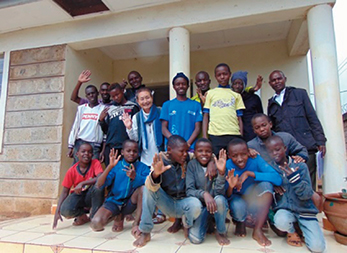
Children who live in the shelter, shelter staff and Ms. Matsushita (Photo: Embassy of Japan in Kenya)
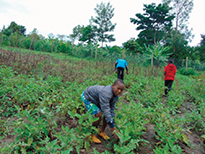
Children harvesting eggplants at the plantation in the Rehabilitation Center (Photo: Embassy of Japan in Kenya)
- Note 13:This is a concept contrasted with “formal education,” which indicates educational activities in the school education system, and is a learning process that is not broadly organized. Examples include courses, etc. for citizens offered at community centers.
